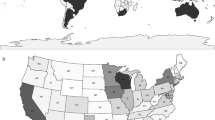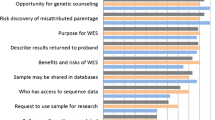Abstract
Deoxyribonucleic acid (DNA) banking is an important laboratory service that preserves the option of future genetic testing. DNA bank consent forms are a critical tool to facilitate thorough and valid informed consent. The objectives of this study were to assess the level of consistency of current clinical DNA banking consent forms with the American Society of Human Genetics (ASHG) and the American College of Medical Genetics and Genomics (ACMG) guidance and to explore variation among the forms. The content analysis matrix included key points identified from the ASHG and ACMG documents (including benefits/risks, sample storage, access, disposition, and communication) and additional points beyond the ASHG and ACMG documents identified from the consent forms themselves during the analysis process. Forms were assessed for language addressing each point. Five consent forms were identified and analyzed for twelve key points and eight additional points. The average consistency for key points was 10.8/12 (range 8/12 to 12/12). The range for additional points was 1/8 to 5/8. There was variation across forms in the details provided related to key and additional points. Gaps in clinical DNA banking consent forms are barriers to achieving informed consent. Clinicians can consider the consent key and additional points discussed here to supplement and enrich their clinical DNA banking informed consent discussions, promote stewardship, and maximize downstream utility of banked DNA. The identification of multiple additional points beyond the ASHG and ACMG documents’ key points indicates a need for this guidance to be updated.
Similar content being viewed by others
Data availability
The datasets generated during and/or analyzed during the current study are available from the corresponding author on reasonable request.
References
ACMG statement. Statement on storage and use of genetic materials. American College of Medical Genetics Storage of Genetics Materials Committee. (1995) Am J Hum Genet 57(6):1499 1500. https://www.ncbi.nlm.nih.gov/pubmed/8533780. Accessed 1 April 2021
Amendola LM, Golden-Grant K, Scollon S (2021) Scaling genetic counseling in the genomics era. Annu Rev Genomics Hum Genet 22:339–355. https://doi.org/10.1146/annurev-genom-110320-121752
Beskow LM, Dombeck CB, Thompson CP, Watson-Ormond JK, Weinfurt KP (2015) Informed consent for biobanking: consensus-based guidelines for adequate comprehension. Genet Med 17(3):226–233. https://doi.org/10.1038/gim.2014.102
Bester J, Cole CM, Kodish E (2016) The limits of informed consent for an overwhelmed patient: clinicians’ role in protecting patients and preventing overwhelm. AMA J Ethics 18(9):869–886. https://doi.org/10.1001/journalofethics.2016.18.9.peer2-1609
Boycott KM, Hartley T, Biesecker LG, Gibbs RA, Innes AM, Riess O, Belmont J, Dunwoodie SL, Jojic N, Lassmann T, Mackay D, Temple IK, Visel A, Baynam G (2019) A diagnosis for all rare genetic diseases: the horizon and the next frontiers. Cell 177(1):32–37. https://doi.org/10.1016/j.cell.2019.02.040
Cadigan RJ, Edwards TP, Lassiter D, Davis AM, Henderson GE (2017) “Forward-thinking” in U.S. Biobanking. Genet Test Mol Biomarkers 21(3):148–154. https://doi.org/10.1089/gtmb.2016.0393
Cleophat JE, Marin A, Pelletier S, Joly Y, Gagnon P, Dery A, Chiquette J, Gagnon B, Roy L, Bitzas V, Nabi H, Dorval M (2020) What do cancer patients’ relatives think about addressing cancer family history and performing genetic testing in palliative care? Eur J Hum Genet 28(2):213–221. https://doi.org/10.1038/s41431-019-0505-3
Coppola L, Cianflone A, Grimaldi AM, Incoronato M, Bevilacqua P, Messina F, Baselice S, Soricelli A, Mirabelli P, Salvatore M (2019) Biobanking in health care: evolution and future directions. J Transl Med 17(1):172. https://doi.org/10.1186/s12967-019-1922-3
Daum H, Mor-Shaked H, Ta-Shma A, Shaag A, Silverstein S, Shohat M, Elpeleg O, Meiner V, Harel T (2020) Grandparental genotyping enhances exome variant interpretation. Am J Med Genet A 182(4):689–696. https://doi.org/10.1002/ajmg.a.61511
DNA banking and DNA analysis: points to consider. Ad Hoc Committee on DNA Technology, American Society of Human Genetics. (1988) Am J Hum Genet 42(5):781 783. https://www.ncbi.nlm.nih.gov/pubmed/3358427. Accessed 1 April 2021
Edwards T, Cadigan RJ, Evans JP, Henderson GE (2014) Biobanks containing clinical specimens: defining characteristics, policies, and practices. Clin Biochem 47(4–5):245–251. https://doi.org/10.1016/j.clinbiochem.2013.11.023
Grebe TA, Khushf G, Chen M, Bailey D, Brenman LM, Williams MS, Seaver LH, Acmg Social E, Legal Issues C (2020) The interface of genomic information with the electronic health record: a points to consider statement of the American College of Medical Genetics and Genomics (ACMG). Genet Med 22(9):1431–1436. https://doi.org/10.1038/s41436-020-0841-2
Green ED, Gunter C, Biesecker LG, Di Francesco V, Easter CL, Feingold EA, Felsenfeld AL, Kaufman DJ, Ostrander EA, Pavan WJ, Phillippy AM, Wise AL, Dayal JG, Kish BJ, Mandich A, Wellington CR, Wetterstrand KA, Bates SA, Leja D, . . ., Manolio TA (2020) Strategic vision for improving human health at the forefront of genomics. Nature 586(7831):683 692. https://doi.org/10.1038/s41586-020-2817-4
Hsieh HF, Shannon SE (2005) Three approaches to qualitative content analysis. Qual Health Res 15(9):1277–1288. https://doi.org/10.1177/1049732305276687
Laracuente R, Waase MP, Kalia I, Wilde AAM, Chung WK (2019) Cases in precision medicine: genetic assessment after a sudden cardiac death in the family. Ann Intern Med 170(10):710–716. https://doi.org/10.7326/M18-2359
McEwen JE, and Reilly PR (1995) A survey of DNA diagnostic laboratories regarding DNA banking. Am J Hum Genet 56(6):1477-1486. https://www.ncbi.nlm.nih.gov/pubmed/7762571. Accessed 1 April 2021
Middleton O, Baxter S, Demo E, Honeywell C, Jentzen J, Miller F, Pinckard JK, Reichard RR, Rutberg J, Stacy C, MacLeod H (2013) National Association of Medical Examiners Position Paper: retaining postmortem samples for genetic testing. Acad Forensic Pathol 3(2):191–194. https://doi.org/10.23907/2013.024
Overwater E, Smulders Y, van der Burg M, Lombardi MP, Meijers-Heijboer HE, Kuijpers TW, Houweling AC (2014) The value of DNA storage and pedigree analysis in rare diseases: a 17-year-old boy with X-linked lymphoproliferative disease (XLP) caused by a de novo SH2D1A mutation. Eur J Pediatr 173(12):1695–1698. https://doi.org/10.1007/s00431-014-2313-7
Page JM, Silver RM (2020) Stillbirth: evaluation and follow-up. Obstet Gynecol Clin North Am 47(3):439–451. https://doi.org/10.1016/j.ogc.2020.04.008
Philippakis AA, Azzariti DR, Beltran S, Brookes AJ, Brownstein CA, Brudno M, Brunner HG, Buske OJ, Carey K, Doll C, Dumitriu S, Dyke SO, den Dunnen JT, Firth HV, Gibbs RA, Girdea M, Gonzalez M, Haendel MA, Hamosh A, . . ., Rehm HL (2015) The matchmaker exchange: a platform for rare disease gene discovery. Hum Mutat 36(10):915 921. https://doi.org/10.1002/humu.22858
Phillips KA, Deverka PA, Hooker GW, Douglas MP (2018) Genetic test availability and spending: where are we now? Where are we going? Health Aff (millwood) 37(5):710–716. https://doi.org/10.1377/hlthaff.2017.1427
Prudent J, Lopez E, Dorshorst D, Cox HC, Bodurtha JN (2021) Demographic and socioeconomic trends in DNA banking utilization in the USA. J Community Genet. https://doi.org/10.1007/s12687-021-00533-4
Quillin JM, Bodurtha JN, Siminoff LA, Smith TJ (2010) Exploring hereditary cancer among dying cancer patients–a cross-sectional study of hereditary risk and perceived awareness of DNA testing and banking. J Genet Couns 19(5):497–525. https://doi.org/10.1007/s10897-010-9308-y
Quillin JM, Bodurtha JN, Siminoff LA, Smith TJ (2011a) Physicians’ current practices and opportunities for DNA banking of dying patients with cancer. J Oncol Pract 7(3):183–187. https://doi.org/10.1200/JOP.2010.000190
Quillin JM, Bodurtha JN, Smith TJ (2011b) Genetic screening and DNA banking at the end of life #206. J Palliat Med 14(5):656–657. https://doi.org/10.1089/jpm.2011.9695
Quillin JM, Emidio O, Ma B, Bailey L, Smith TJ, Kang IG, Yu BJ, Owodunni OP, Abusamaan M, Razzak R, Bodurtha JN (2018) High-risk palliative care patients’ knowledge and attitudes about hereditary cancer testing and DNA banking. J Genet Couns 27(4):834–843. https://doi.org/10.1007/s10897-017-0181-9
Roman MJ, De Backer J (2022) Hereditary thoracic aortic disease: How to save lives. J Thorac Cardiovasc Surg 163(1):39–45. https://doi.org/10.1016/j.jtcvs.2021.01.075
Semsarian C, Ingles J, Wilde AA (2015) Sudden cardiac death in the young: the molecular autopsy and a practical approach to surviving relatives. Eur Heart J 36(21):1290–1296. https://doi.org/10.1093/eurheartj/ehv063
Thorpe J, Osei-Owusu IA, Avigdor BE, Tupler R, Pevsner J (2020) Mosaicism in human health and disease. Annu Rev Genet 54:487–510. https://doi.org/10.1146/annurev-genet-041720-093403
Yates JR, Malcolm S, Read AP (1989) Guidelines for DNA banking. Report of the Clinical Genetics Society working party on DNA banking. J Med Genet 26(4):245–250. https://doi.org/10.1136/jmg.26.4.245
Acknowledgements
The authors would like to thank Jessie H. Conta for her review and comments on this manuscript.
Funding
Samuel Huang is supported by the National Institute of General Medical Sciences Postdoctoral Fellowship in Medical Genetics 5T32GM007454.
Author information
Authors and Affiliations
Contributions
Conceptualization, Samuel Huang, Laura Amendola, and Darci Sternen; data curation, Samuel Huang; formal analysis, Samuel Huang and Darci Sternen; funding acquisition, N/A; investigation, Samuel Huang and Darci Sternen; methodology, Samuel Huang and Darci Sternen; project administration, N/A; resources, N/A; software, N/A; validation, Samuel Huang and Darci Sternen; visualization, Samuel Huang and Darci Sternen; writing — original draft, Samuel Huang, Laura Amendola, and Darci Sternen; writing — review and editing, Samuel Huang, Laura Amendola, and Darci Sternen; supervision, Darci Sternen.
Corresponding author
Ethics declarations
Ethics approval
This study did not involve human participants, individual-level data collected from humans, or bio-samples collected from humans.
Conflict of interest
Darci L. Sternen is employed by Seattle Children’s Hospital Laboratory, which offered a DNA bank service until 2020. Laura M. Amendola is an employee of Illumina, Inc. Samuel J. Huang declares no potential conflict of interest.
Additional information
Publisher's note
Springer Nature remains neutral with regard to jurisdictional claims in published maps and institutional affiliations.
Rights and permissions
About this article
Cite this article
Huang, S.J., Amendola, L.M. & Sternen, D.L. Variation among DNA banking consent forms: points for clinicians to bank on. J Community Genet 13, 389–397 (2022). https://doi.org/10.1007/s12687-022-00601-3
Received:
Accepted:
Published:
Issue Date:
DOI: https://doi.org/10.1007/s12687-022-00601-3




